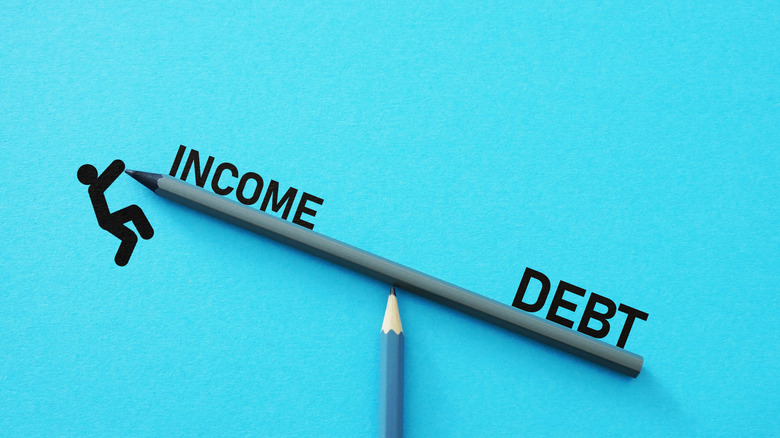Reasons You May Have Been Denied A New Credit Card (Other Than Your Credit Score)
The world of credit cards, and credit lines, is complicated by all kinds of confusing calculations. Those who use credit products will likely be familiar with what a credit score is. Your credit score is essentially an algorithmic attempt to make sense of how likely you are to repay your debts without issue. It's worth remembering that borrowers with great credit sometimes fall behind on their bills, and those who have good or even bad scores can still manage their debts with incredible responsibility and a deft hand. Ultimately, credit scores aren't the end all be all when it comes to exploring the world of borrowing — and those who have applied for credit cards will know this on a more intimate level than others.
There are indeed times when you might apply for a credit card, with a great credit score, only to be turned down. In general, people looking for a new line of credit have the ability to get a pre-approval, or even utilize tools to explore their chances of being approved before applying. You may go into your application with great confidence that you'll wind up with the card you want only to be denied, and left wondering why. Since your credit score is just one tool for establishing the likelihood that you'll manage a new account responsibly, lenders look at more than just your credit score when considering an application. While your credit score acts as a good starting point, it doesn't feature the same nuance that individual factors can provide.
Your debt-to-income ratio is too high
The first thing that lenders will look at is your debt-to-income ratio. Your debt-to-income ratio helps dictate what your credit score looks like, however, when taken out of this equation and looked at on its own, this statistic can say a lot about your financial habits. Your debt-to-income ratio generally tracks with how much you have to spend servicing debts on a monthly basis in relation to your income figure. Your mortgage, minimum payments for credit cards, student loan bills, and any other ongoing debt that you pay is added up and then measured against your monthly income as a percentage.
Those looking to introduce the maximum amount of financial flexibility into their lifestyle will want to strive for a DTI that is at or below 10%. However, this isn't always possible, especially considering the reality that most people will struggle to keep their monthly housing expenses — whether that's rental costs or a mortgage — at (let alone below) 30%of their monthly income. Ultimately, a healthy, and more realistic, DTI that includes all of your ongoing costs should sit somewhere around 35% to 40%. This means your debt-to-income ratio, minus housing expenses, should ideally be around this 10% mark or lower. If you're paying too much in monthly credit card bills, a debt consolidation loan might be a better option when seeking new funding opportunities.
You've opened 'too many' new accounts recently
Many consumers are in the habit of applying for new credit cards on a vague, rolling basis. Accepting new offers that have favorable terms while managing your existing credit accounts responsibly can have a net positive effect on the whole. But, every time you open a new account it can create a knock-on effect that impacts future financial options. If you have opened more than one credit card account recently you may experience a blanket denial from any lender you approach for a new card during a short cooling off period. Every card issuer will have their own regulations, but generally speaking you won't be able to open new cards within six month windows of each other.
If you are looking for more than one card at roughly the same time, the best approach is to apply for the cards you're considering at the same time and accept offers in a batch rather than individually. You might be planning a blockbuster vacation for your family in the coming years, for instance. Opening credit card accounts connected with your airline of choice, or perhaps a hotel chain, ahead of major expenses can help you start racking up points. Just keep in mind that with a massive expansion in your available credit comes the temptation to overspend.
The lender suspects you might be 'credit card churning'
If you are someone who frequently opens new accounts you may end up being seen as a 'churner.' There's technically nothing wrong with churning through credit cards in order to take advantage of reward point offerings. In fact, as long as you are using your accounts responsibly, churning can be a great way to boost your cash back value, travel rewards point reservoir, and more. There are also a wide range of benefits that individual card issuers provide to their users. You might open up an American Express account specifically to gain access to a live event presale opportunity for advantageous tickets to see your favorite band or team, for instance. This might be the only use for the card and then, once you've paid off the purchase, you might ultimately dump the card.
However, while lenders understand that these kinds of practices happen, they don't necessarily like it. Churning through cards can make lenders less likely to approve you for a new piece of plastic in the future. Closing an account within a year of opening it is the best way to get flagged as a card churner. You'll want to be careful about this practice, especially with larger companies that may offer value to you in the future, such as big name brands like Amex or Capital One, for example.



